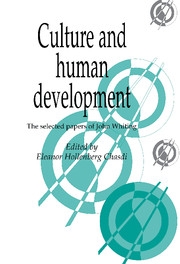Book contents
- Frontmatter
- Contents
- List of figures
- Preface
- Acknowledgments
- Introduction: John Whiting and anthropology
- Fifty years as a behavioral scientist: autobiographical notes
- Part I Theory and methods
- Part II Environment and history
- Part III Moral development
- Part IV Gender development
- Part V Development of social behavior
- Introduction
- 11 Altruistic and egoistic behavior in six cultures
- 12 The duration of maidenhood across cultures
- 13 Social change in adolescent sexual behavior, mate selection, and premarital pregnancy rates in a Kikuyu community
- Bibliography
- Complete bibliography of John W. M. Whiting's work
- Index
Introduction
Published online by Cambridge University Press: 23 December 2009
- Frontmatter
- Contents
- List of figures
- Preface
- Acknowledgments
- Introduction: John Whiting and anthropology
- Fifty years as a behavioral scientist: autobiographical notes
- Part I Theory and methods
- Part II Environment and history
- Part III Moral development
- Part IV Gender development
- Part V Development of social behavior
- Introduction
- 11 Altruistic and egoistic behavior in six cultures
- 12 The duration of maidenhood across cultures
- 13 Social change in adolescent sexual behavior, mate selection, and premarital pregnancy rates in a Kikuyu community
- Bibliography
- Complete bibliography of John W. M. Whiting's work
- Index
Summary
This section contains three articles. The first is based on the Six Cultures Study, which was briefly described in the Autobiographical notes (pp. 14–41). In the Six Cultures Study, mothers were interviewed and children's behavior was observed and analyzed in specific communities in Africa, India, Mexico, Okinawa, the Philippines, and the United States. This is the first cross-cultural study designed to collect data on the systematically observed behavior of children in their own natural surroundings. Previous studies, usually undertaken in experimental situations, attempted to assess children's behavior indirectly through standard projective tests, doll play, or other modifications of projective techniques.
The first article, “Altruistic and egoistic behavior in six cultures,” investigates a wide range of children's social behavior. The term “altruistic” refers to behavior that offers help and support to others, as well as making responsible suggestions to them. “Egoistic” refers to behavior that benefits the self, and includes seeking dominance over others, and seeking help and attention from them.
The data show striking cultural differences on the altruistic–egoistic dimension: the children of the East African community score highest on altruism, the children of New England, USA, score lowest, and the other communities fall between these two extremes. Analyses are also made for differences in sex, age, sibling order, family structure, task assignment, and cultural complexity. Significant findings are reported in many of these areas, including a positive relationship between task assignment and altruism.
The authors discuss the strong emphasis placed on egoism in modern, industrial society, the psychic cost to its individual members, and offer some modest suggestions for encouraging altruism.
- Type
- Chapter
- Information
- Culture and Human DevelopmentThe Selected Papers of John Whiting, pp. 265 - 266Publisher: Cambridge University PressPrint publication year: 1993



